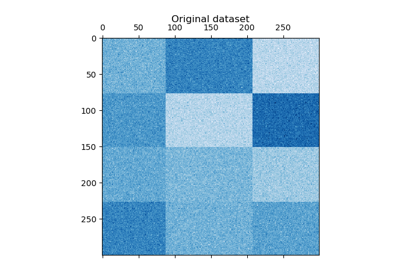sklearn.datasets.make_checkerboard¶
-
sklearn.datasets.make_checkerboard(shape, n_clusters, *, noise=0.0, minval=10, maxval=100, shuffle=True, random_state=None)[source]¶ Generate an array with block checkerboard structure for biclustering.
Read more in the User Guide.
- Parameters
- shapeiterable (n_rows, n_cols)
The shape of the result.
- n_clustersinteger or iterable (n_row_clusters, n_column_clusters)
The number of row and column clusters.
- noisefloat, optional (default=0.0)
The standard deviation of the gaussian noise.
- minvalint, optional (default=10)
Minimum value of a bicluster.
- maxvalint, optional (default=100)
Maximum value of a bicluster.
- shuffleboolean, optional (default=True)
Shuffle the samples.
- random_stateint, RandomState instance, default=None
Determines random number generation for dataset creation. Pass an int for reproducible output across multiple function calls. See Glossary.
- Returns
- Xarray of shape
shape The generated array.
- rowsarray of shape (n_clusters, X.shape[0],)
The indicators for cluster membership of each row.
- colsarray of shape (n_clusters, X.shape[1],)
The indicators for cluster membership of each column.
- Xarray of shape
See also
References
- 1
Kluger, Y., Basri, R., Chang, J. T., & Gerstein, M. (2003). Spectral biclustering of microarray data: coclustering genes and conditions. Genome research, 13(4), 703-716.

